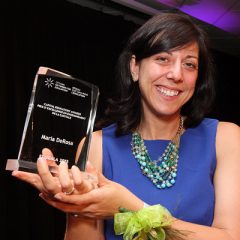By Emily Cook, TLS Staff Writer
If you’re not a fan of chemistry yet, Professor Maria DeRosa is here to change that.
DeRosa helps her students develop an understanding not only of fundamental material, but the broader impact chemistry has in the world.
“I love chemistry, so I want to show how these concepts are important to them in their everyday lives,” she says.
DeRosa has been teaching in Carleton’s chemistry department for 10 years. This year she was recognized with a Capital Educators’ Award for her ability to connect classroom learning to the real world.
DeRosa says she wants to help everyone in her classes learn to appreciate or even love chemistry, but negative stereotypes about the subject can make this hard.
“My first goal is to really break down those initial barriers that many people have when they think about chemistry,” she says.
DeRosa says she instills an appreciation for chemistry in her students by asking them to find applications of it in the media. She says this activity increases student engagement in her classes because they see why it matters.
“We know literacy’s important, but what about science literacy? I think everyone should have a basic understanding of chemistry,” she says.
DeRosa says she wants to focus now on applying these concepts to larger classrooms. She says she’s considering a flipped classroom, where class time is for working through problems and lectures happen at home.
“I’m always trying to investigate how we do a better job in teaching these large groups,” DeRosa says. “That’s what I’m going to be doing for the next few years, really focusing on that.”
DeRosa says she’s also always been an early adopter of new software to engage students, including online office hours, and she incorporates her own research whenever she can into her classes to teach students the role research plays in moving science forward. All these teaching methods work towards her ultimate goal, she says, to extend students’ views of chemistry to the real world.
“My biggest goal, if they don’t love chemistry at the end, is at least they respect and appreciate chemistry.”
